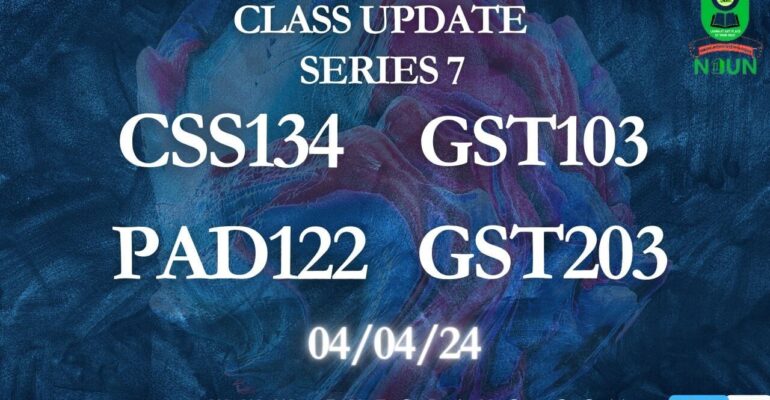NOUN ONLINE CLASS S7
April 4, 2024 2024-04-08 16:33NOUN ONLINE CLASS S7
NOUN ONLINE CLASS S6; CSS134, GST103, PAD122, GST203 04/04/24
CSS134 CLASS VOL 4
In this volume of the CSS134 class, mineral resources in Nigeria are discussed.
What are Mineral Resources?
Mineral resources are resources freely given by nature to man’s profitable use when extracted and processed, they are materials limited to certain areas and territorially and they seem to be insignificant in their natural state, but become a big deal when they are processed.
What Mineral Resources are in Nigeria?
Mineral resources in Nigeria can be categorized into three categories which are;
a.
Industrial Minerals
Under industrial minerals, we have the likes of the following;
a.
Marble
b.
Gypsum
c.
Sands
d.
Limestone
e.
Gravels
f.
Feldspar
g.
Granites and lots more
b.
Metallic Minerals
Under the metallic minerals, we have the likes of the following;
a.
Wolframite
b.
Columbite
c.
Cassiterite
d.
Gelena
e.
Tantalite
f.
Gold
g.
Iron ore
C. Mineral Fuels
Under Mineral fuels, we have resources such as;
a.
Natural gas
b.
Tar sands
c.
Coal lignite
d.
Crude oil
What are the benefits of Mineral Resources?
Natural resources come with a hand-full of benefits, among these benefits are;
a.
Natural resources give room for mass employment
b.
The exploitation of natural resources brings about foreign exchange
c.
The exploitation of natural resources brings about industrial development
d.
Natural resources could serve as a major source of income, generating tons of revenue.
To get details of the CSS134 CLASS VOL 4 use the link below.
GST103 CLASS VOL 4
In this volume of the GST103 class, the computer virus is discussed.
What is the computer virus?
Computer viruses are programs written by a developer, these programs are written for just one purpose; which is destruction and havoc.
The computer virus is created by people who know so much about the computer and how it works.
Computer virus is seen as one of the greatest threats to the computer’s well-being.
How does a computer virus work?
When this program (virus) is ready it is distributed through various means, which are;
a.
The Internet
b.
E-mails
c.
Applications
d.
Downloaded files
e.
Softwares
f.
File Sharing process
g.
Shareware
h.
Modes of data transporting etc
At first, it affects just a single file, then it spreads out gradually. At first impact its effect is not obvious, the virus takes it to study and understand its environment then gradually it spreads out.
How to know virus-infected computers?
As mentioned earlier, when a virus escapes into your computer, it functions subtly. With time it starts to act gradualing.
The following signs make it obvious that your computer is affected by a Virus;
a.
Data infection
b.
Data Malfunction
c.
Data Overwrite
d.
Data Destruction
e.
Data Corruption and lots more
To get details of the class use the link below to join the GST103 CLASS VOL 4.
PAD122 CLASS VOL 3
In this volume of the PAD122 class, performal appraisal is discussed.
What does Performance Appraisal really mean?
Performance appraisal can be seen as a ritual or a process that is based on a system whereby a series of observations are done to evaluate the productivity, behavior, attitude, and most importantly performance at work, in line with the standard, policy, and work ethic of the organization.
What are the methods of Performance Appraisal
Performance appraisal can be carried out in two ways, these are;
a.
Formally
b.
Informally
When appraisal is done formally it involves the use of strategies that are orderly planned and systematically implemented within a particular time frame.
To get details of the class use the link below to join the PAD122 CLASS VOL 4.
GST203 CLASS VOL 3
In this volume of the GST203 class, the contributions of different scholars to Philosophy are discussed.
Who are the Philosopher whose work contributed to
philosophy?
Dating back to the Medieval or Middle Ages, during the 11th century research has it that philosophers were particular about two major things where;
a.
Proving the existence of God
b.
The classical philosophy of Greece
Philosophers whose work contributed immensely to philosophy are;
a.
Avicenna
b.
St. Austine
c.
St. Anselm
d.
St. Thomas Aquinas
e.
Niccolo Machiavelli
f.
Francis Bacon
g.
John Locke
h.
Thomas Hobbes
i.
Jean Jacques Rousseau
To get details of the class use the link below to join the GST203 CLASS VOL 4.
Search
Popular posts

Popular tags


